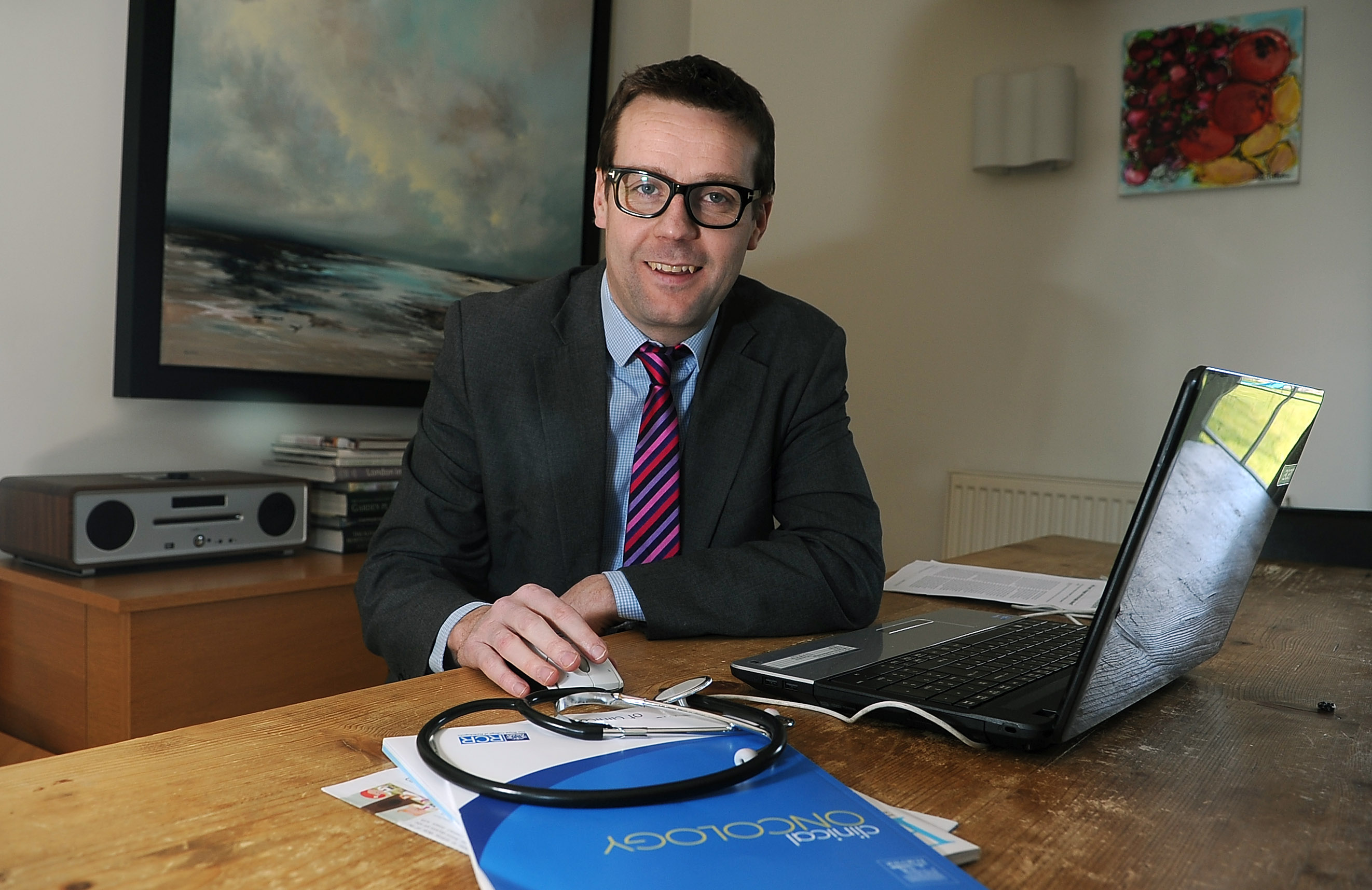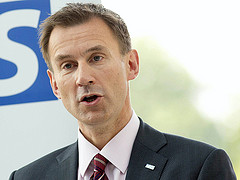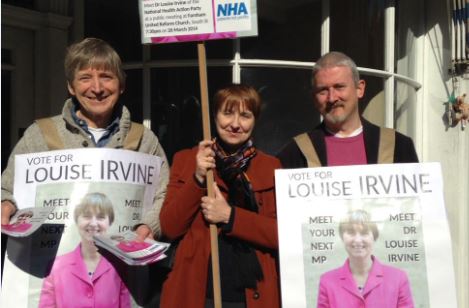General Election 2015 and the future of the NHS

As the UK's general election on 7 May draws near, Andrew McConaghie examines some of the key issues for healthcare, starting with a new political party led by NHS doctors, National Health Action.
Dr Louise Irvine, the NHA candidate is challenging Health Secretary Jeremy Hunt in South West Surrey
The state of the National Health Service (NHS) is a constant preoccupation in the UK, and never more so than in the run up to a General Election.
Two separate surveys in January (by BBC/Populus and ComRes) found the NHS to be the single most important election issue among voters, undoubtedly fuelled by reports of crisis within the health service.
Less than 60 days to go before election day, a poll-of-polls of overall voting sentiment compiled by the Daily Telegraph shows Labour on 34 per cent, just one percentage point ahead of the Conservatives.
The surveys show David Cameron's Conservatives more trusted to handle the economy, while Labour remains the most trusted to manage the NHS, despite its leader Ed Miliband's low standing in the eyes of most voters.
But the days of a two-horse race are long gone and UKIP, Lib Dems, the Green party and the SNP in Scotland could all play a decisive role. Many believe that Labour and the SNP forming a coalition Westminster government to be the most likely scenario.
The National Health Action party
Against this background of concern for the future of the NHS, and the rise of 'fringe' parties, the National Health Action (NHA) party has emerged.
What makes the NHA remarkable is that it is led by a mix of doctors, nurses and other healthcare professionals, and was formed in angry response to the Health and Social Care Act reforms introduced by the Conservative-Lib Dem coalition in 2012.
The NHA is dedicated to fighting what it calls the 'disastrous' reforms and creeping privatisation of the NHS – and is hoping to give the Conservative party leadership a bloody nose in the General Election.
Formed just three years ago, the NHA is putting up candidates in 13 parliamentary seats across England to contest the election.
NHA leader and co-founder is Dr Clive Peedell is a consultant clinical oncologist, and says he and other healthcare professionals set up the party because they were 'absolutely appalled' by the Conservative-led reforms, which they say have damaged and undermined the health service.
He says bodies like the BMA and the Academy of Royal Colleges have not been listened to by governments.
"Doctors, nurses and other healthcare professionals have the solutions to deliver a service [but] in the last 30 years the political establishment has not wanted to listen to people who can run the services," Peedell told BBC Radio 5 Live recently.
In identifying the role of markets and growing private sector involvement as the biggest threat to the NHS, the NHA stands clearly apart from the major political parties.
"They [the main political parties] wanted to introduce a market-driven health system, they want the private sector to actually deliver a lot of the care and tell us how to organise the health service, so as a doctor I felt I needed to get involved in politics."
To drive the message home and raise maximum publicity, Peedell is standing against the Prime Minister David Cameron in his constituency in Witney, Oxfordshire. Meanwhile Health Secretary Jeremy Hunt is being challenged in South West Surrey by South London GP Louise Irvine.
Ramping up political campaigning over the last 12 months, Dr Peedell and the NHA have gained a significant profile in traditional and social media about the future of the NHS.

NHA leader Clive Peedell
Peedell harbours no illusions about actually defeating David Cameron in his own constituency, but believes his party can influence future health policy.
Speaking to The Lancet last week he said: "If we can raise our voice in the melee of all the political debate, we could make a big difference."
The NHA says the health service can't survive for another five years without increasing spending, and calls for a complete end to market-led policies which have been pursued by Labour and the Conservatives over the last 25 years.
Outrage at top-down reform
One reason for the fierce opposition among health professionals to the Health and Social Care Act was that it broke an election promise: the Conservatives had expressly ruled out 'top-down' reform in its 2010 election manifesto – only to reveal the biggest ever reorganisation of the NHS a few months after coming to power.
The reforms also opened up more NHS services to the private sector, with primary care open to 'any qualified provider', including firms such as Virgin Care, which won a contract in 2012 to run community services in Surrey. However this wasn't a new approach - Lansley was merely extending the previous Labour government's policy. The belief is that by creating competition within the system, patients have a choice, and this helps improve standards and drive down costs.
But these initiatives are what the NHA say is threatening to unravel the health service – they say private providers 'cherry pick' the best services, taking funds from the NHS and leaving it with the complicated and unprofitable services.
While NHA is clearly located politically on the left, at the other end of the spectrum, free market groups champion competition. By introducing private sector companies to compete, Labour and now the Conservatives have wanted to shake up inefficient and outdated NHS monopolies, which are not responsive to changing patient needs.
Standing outside politics, most in the health service would agree that the NHS needs drivers for change in order to overcome inertia in management or clinical practices in large and complex organisations – even if no-one can agree on how it should be done.
The very worst of the NHS culture has been laid bare in shocking reports on events at Stafford General hospital (in 2013) and most recently, Morecambe Bay Trust. These investigations uncovered tragic stories of sub-standard care, neglect and unnecessary deaths, where failings were missed or covered up at all levels.
In the Morecambe Bay Trust report, a 'lethal mix' of failings was identified which caused the avoidable deaths of at least 11 babies and one mother – failings which began with a 'dysfunctional maternity unit' run by staff 'deficient in skills and knowledge'.
Detractors of the NHS say such lapses reflect the failings of the public sector, while groups like the NHA apportion more blame to pressure to reach financial targets rather than clinical ones. However Clive Peedell and the NHA have had to tread carefully in their position, for fear of defending indefensible lapses in care and clinical practice.
Mind the £30 billion gap
Just months after the Health and Social Care Act was finally passed in 2012, Prime Minister David Cameron recognised the reforms had become a political liability, and Andrew Lansley lost his job in a cabinet reshuffle. He was replaced by Jeremy Hunt, who has had to focus on limiting the damage caused by the reforms and dealing with those historic scandals of neglect, unnecessary deaths and management cover-ups.
In political terms, of greatest concern are media reports of dangerously overstretched accident & emergency departments and a health service nearing crisis because of growing demand and static budgets.
The question of how to fund health spending in the long term, and make it sustainable, is the one over-arching question that preoccupies governments and health leaders – not just in the UK, but in all developed nations.
Last October, NHS England's chief executive Simon Stevens unveiled the Five Year Forward View, a plan to tackle the mammoth challenges facing the health service.
In it NHS England, financial regulator Monitor and other leading health service organisations warned that the NHS faces a budget deficit of £30 billion by the year 2020 if the health service isn't reformed.
While the report states that £22 billion can be saved through measures such as integration, it concludes that an extra £8 billion in funding for the period is required.
None of the main political parties has unequivocally signed up to this funding commitment yet (even though many health experts think it a conservative estimate) though Labour is pledging slightly less severe public spending austerity than the Conservatives.
Amid all this doom and gloom, there are contradictory signals. Last June a survey of 11 health systems judged the NHS to be the best in the world, the Commonwealth Fund praising it for high standards, including quality care, access and efficiency. Then in January this year, another independent survey found satisfaction with the NHS was rising, and dissatisfaction at an all-time low.
Jeremy Hunt now regularly cites these surveys, praising the service and pledging to retain a tax-funded NHS 'free at the point of care'. The Conservatives have learnt from previous elections that this is one of the issues – or even perhaps the single biggest issue - which the British public feel most strongly about.
Targeting Jeremy Hunt
Godalming is a small town in Surrey's wealthy stockbroker belt 45 minutes from London, and has always been solidly Conservative.
Concerns about employment and immigration are less pressing in this prosperous corner of southern England, and instead opposition to large new housing developments on greenbelt land and fears about the future of health and social care are the headline issues.
Health secretary Jeremy Hunt is the local MP and has a majority of over 16,000, making his one of the safest seats in the country.
The NHA's candidate in the South West Surrey seat, Dr Louise Irvine, is a general practitioner of 26 years who currently practices in South London.
She says she has always been a campaigner, and states simply: "When things are wrong you shouldn't just accept them, you should try to change things."
The bookmakers Ladbrokes have Hunt as the runaway favourite to win the seat, but give the NHA on 16-1, respectable odds which put them in second place, ahead of UKIP and the Lib Dems.
Dr Irvine has a history with Jeremy Hunt, having already claimed a very considerable victory against him.
In October 2013, Dr Irvine was the chair of the Save Lewisham Hospital campaign when it dealt a humiliating blow to Jeremy Hunt by blocking his order to close the hospital's maternity and A&E departments.
The campaign won its victory against closure when The High Court ruled that Mr Hunt was operating outside his powers when he ordered the cuts. Moreover, the law has now been clarified to block the government gaining powers to enforce hospital closures.
"It shows what can be achieved when people get together to fight threats to the NHS," she says.
Dr Irvine adds that Jeremy Hunt has his share of the blame for continuing the damaging policies of his predecessor Andrew Lansley, and accuses him of being disingenuous about the scale of privatisation.
"Jeremy Hunt says there is not really privatisation going on, and those that do are really just scaremongering. But then he'll say, 'or if there is some, there is just a little bit.'"
The NHA are not the only political pressure group who have been active in Hunt's backyard – a group called the People's NHS mounted a campaign in the area in January warning of the threat of TTIP to the health service. TTIP is a free trade agreement currently being negotiated between the US and EU, which some groups believe could result in health services being forced to open up to private competition.
Hunt and the Department of Health maintain that TTIP won't result in forced privatisation, but doubts remain as the negotiations continue behind closed doors.
In a letter to the local paper in his constituency, Hunt addressed the wider question of NHS privatisation, saying just 6 per cent of funds go on outsourcing work to the private sector, and that growth in outsourcing is "half what it was under the previous government".
He nevertheless reiterated his support for private providers in hip and knee operations (first introduced by Labour), a policy welcomed by patients as it has now driven down average waiting times to just weeks when once it was many months.
Louise Irvine says in areas such as this, and in outpatient and diagnostic services, outsourcing now accounts for 20-30 per cent of services, funding which goes to private companies, and not general hospitals providing a full range of services.
The future - integrated care
There are signs the NHA's anti-competition argument has gained ground, as enthusiasm for marketisation and private sector involvement is waning.
In November last year, Jeremy Hunt signalled a significant break with the orthodoxy of competition as the primary driver for reform.
Speaking to the Health Service Journal, Hunt said he did not believe "the market will ever be able to deliver" the goal of creating integrated out-of-hospital care.
He added that choice was not the main driver of performance improvement, a break from the policy first established by Labour in the 2000s and continued by his coalition government.

Health Secretary Jeremy Hunt
He said he recognised "there are natural monopolies in healthcare, where patient choice is never going to drive change".
Indeed 'integrated care' is now the phrase on everybody's lips in the health service, which means not only joining up services between hospitals and primary care, but also linking health with social care. Integrated care is in many ways the opposite of using market forces within healthcare, and has been enthusiastically championed by health service leaders.
Now the Conservatives have just unveiled eye-catching plans to devolve power to the Greater Manchester region to control a £6 billion combined health and social care bill.
Clive Peedell and Louise Irvine have expressed serious concerns about the move, including fears that the health budget will be used to prop up what they say is an underfunded social care budget.
Irvine says merging one creaking ship with another leaky ship "will not make a sea worthy vessel" – and devolving power to separate regions in a piecemeal way further undermines the idea of a truly 'national' health service.
So we know what the NHA is against, but what is its solution to the NHS funding crisis? Its manifesto proposes putting an extra penny on the pound in income tax to pay for the health service, which they forecast would generate £4.5 billion in annual revenues.
Louise Irvine says there is a huge hidden cost to administering a market – one study published in 2014 estimated the cost of managing the NHS market to be at least £4.5 billion annually – a windfall figure if the market were to be scrapped as her party proposes.
The NHA is quite closely aligned with Labour on some policies – shadow health secretary Andy Burnham has pledged to repeal the Health and Social Care Act and its Section 75, which mandates open tendering for services.
Despite this ideological closeness, politics demand that the emphasis before election is on competition, not collaboration: Labour is wary of similar groups such as the NHA stealing its votes, so there is no love lost between the parties.
Both Labour and the NHA have talked in terms of this election being 'the last chance to save the NHS' – though this kind of hyperbole turns off as many voters as it persuades.
While talk of a 'last chance' is probably overstating the case, 2015 has seen one party proposing eliminating the tax-funded 'free at the point of care' health service – UKIP.
Its leader Nigel Farage says he believes the country may need to consider moving to a private health insurance system (as used in many other countries) if the current NHS model proves unsustainable.
It is a measure of the British attachment to the NHS that most of the other leaders within UKIP rejected the idea out of hand, at least for now. But it also demonstrates the pressure on the NHS to maintain its high standards and keep evolving between now and 2020, whoever its political masters are.
Related article
Six potential high-impact outcomes of NHS devolution for industry
About the Author
Andrew McConaghie is pharmaphorum's managing editor, feature media.
Contact Andrew at andrew@pharmaphorum.com and follow him on Twitter.
Read more from Andrew McConaghie:
Cancer Drugs Fund: winners and losers in pharma, but a long-term fix is needed











